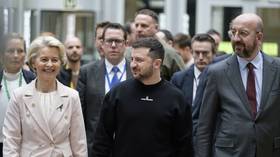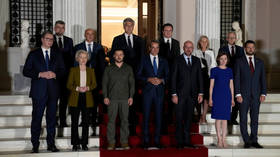Timofey Bordachev: Ukraine in the EU will only exacerbate the bloc’s growing irrelevance

European integration is one of the most mythologized subjects of modern global politics, which is already full of illusions and legends that have nothing to do with the harsh reality of international relations.
In practical terms, the cooperation of a large group of Western European countries in state regulation of the economy is obvious: it has allowed a relatively fair distribution of the benefits of a universal market. In political terms, however, this cooperation has created such a large, ephemeral superstructure that it is impossible to distinguish truth from deception, or even fiction, when it comes to the European Union.
And we can only guess at the future forms of interaction among Western European states, whose main objective will remain to keep their peoples subservient to the will and whims of their untouchable elites. Therefore, the simplest prediction about the future of European integration is one based on the optimal forms of maintaining social stability. Even if this requires, for example, a shift away from traditional economic activities or a complete abandonment of the ability of countries to manage their own finances. Thus, European integration will take the form necessary to fulfill its primary purpose.
If this means admitting countries to the EU that are not formally ready, that is no problem either. The existence of clear rules determining which state with which economic and political system is a suitable ‘newcomer’ is nothing more than a myth. Or a product of its time, such as the ‘Copenhagen Criteria’ for membership, which were developed for a very different international reality. All the more so because the suitability of a country for membership is not a dogma, but an instrument for dealing with it by those who set the tone within the bloc.
The same is true of the internal development of the EU, and it would be naive to see deviations from the mythologized template of its stability that emerged in our perception in the 1990s as signs of dramatic decline and degradation. Even the apparent intellectual hunger of the upper echelons of ‘united Europe’ can only horrify idealists like the author of these lines. In reality, we do not know whether European integration now needs clever political leaders or even creative bureaucrats. After all, if heads of state and government are appointing failed women or elderly traitors to top positions, then perhaps this is exactly what the EU member states need and what is in their national interest.
Over the past decade and a half, the EU has experienced several major crises, none of which have fatally wounded it, although they have seriously changed it internally. Each time, the reaction of EU countries has been exactly the opposite of what one would expect on the basis of the dogma of European integration. Between 2008 and 2013, the EU economies were caught in the maelstrom of the global financial crisis. Several countries of the south, most notably Greece, suffered the most. Together with Spain, Portugal and Ireland, Athens even lost its sovereignty in setting macroeconomic policy. The measures taken in 2011 to strengthen financial stability in the Eurozone have dealt a blow to the main achievement of integration – a relatively fair distribution of the benefits of the common market: now the EU has created ‘perpetually poor’ and ‘perpetually rich’ countries.
At the same time, Germany and France have succeeded in seriously extending the scope of the qualified majority rule, which allows secondary legislation to be adopted on the condition that it is supported by 55% of the member states representing 65% of the EU’s total population. Such a principle allows a few big powers to dictate the rules by winning over a couple of medium-sized countries. As a result, much of the EU’s internal politics has become a clique of Germany and its French and Nordic allies, rather than a search for compromise by all its members. Everyone else has found themselves in a position where they can only fight for the distribution of benefits, the specific size and rules of which are determined by a small group of states.
The second crisis to hit the EU in 2014-2015 was caused by the influx of refugees from the Middle East and Africa. Several factors contributed to the urgency of the situation. Firstly, the number of those suffering had indeed increased dramatically – it had reached hundreds of thousands, if not millions. Second, under the circumstances, Turkey started its own game, using the refugees as an instrument of pressure on Brussels and Berlin. All the more so because then-German Chancellor Angela Merkel’s populism demanded that the EU pour money into the problem at Turkey’s borders, because otherwise she would really have had to fulfill her promise to take in all the refugees.
Thirdly, political reality came into conflict with a long-standing myth: according to its slogans, the EU was a union of like-minded people, while in reality each country only cared about its own citizens. The refugee crisis did not deal a fatal blow to the structure of the bloc precisely because the solidarity it most endangered was a myth in the first place. If it had worked and countries had sabotaged common policies, it would have been a problem. And since no one believed in solidarity as it was, everyone gradually accepted the fact that some countries took in refugees while others only pretended to open their doors to them. In the end, the southerners were simply ‘pushed under the bench’, and threatened that their demands for a fair redistribution of refugees within the EU could lead to budgetary problems.
The third crisis to hit all of Europe was the coronavirus pandemic in 2020. Here, the familiar features of the current stage of integration were on full display: a lack of solidarity, a poorly qualified bureaucracy in Brussels, economic inequality and, of course, the rich countries agreeing on how much of the ‘common’ budget cake they were prepared to share with weaker members of the community.
At the same time, there was a mini-crisis triggered by Brexit. We are not particularly interested in the reasons why the British elite decided to go down this road, but its result could really have been the complete domination of Berlin and its closest satellites within the EU. But a force majeure has occurred in the East, and the EU countries must find new solutions in a radically changed international environment.
Europe is now experiencing its fourth major modern crisis, centered on the military and political conflict with Russia over Ukraine. The likelihood of the confrontation with Moscow becoming a consolidating factor for the EU is negligible. The engine of this confrontation is NATO, and European integration has rapidly become a foreign economic appendage of the US-led military bloc. As a result of the unprecedented severing of ties with Russia, even Germany, which was used to leading the EU, is now not doing well.
The other members of the EU are basically indifferent – you don’t cry about your hair when you’ve lost your head. Also, the fact that the conflict with the Russians hits the arrogant Germans the hardest is even good for Italy, Spain, and France, in some respects. Moreover, it is the southern Europeans and the French who have the least to lose from the Ukraine crisis. They had no chance of doing anything serious on the international stage without a green light from Washington.
The Germans, on the other hand, at one stage could actually believe that they were acting independently and even stammered about an equal dialogue with the Americans. All that is now in the past. So are the unique advantages that Germany enjoyed from its energy partnership with Russia. So things are not so bad for the rest of the EU countries that have been living under German diktat in previous years.
Western European elites are constantly looking for ways to maintain their status. The evolution of European integration is one of the important tools in this search. The EU’s collective institutions – the European Commission, the European Parliament, and the Court of Justice – have found themselves in a new reality. The single market provides the basic freedoms to which ordinary people have become accustomed: relatively cheap goods, protection from foreign competitors and the ability to move easily from one EU country to another in search of a better deal.
The achievements of integration in the field of mutual openness are very conducive to the atomization of society, where there is no longer a collective interest of citizens, but only individual interests. Even the influx of Ukrainian refugees has not become a serious problem – the EU labor market is ready to digest a significant proportion of cheap labor. After all, not all those who came from Ukraine are crooks and millionaires hiding from mobilization. Of these several million people, the majority are ordinary workers ready to take any job and ready to provide services in the formal and informal sectors.
I am far from believing that the EU will face serious upheaval in the near future. The only factor creating real uncertainty is the growing popularity of the non-systemic opposition in Germany. But even here there is a high probability that even the radicals of the AFD will be tamed – not by Brussels, but by Washington. As an organization, the EU is on its way to becoming an economic appendage of NATO, as skeptics have warned since the early days of integration.
In short, the benefits Western Europeans derive from the common market are enough for them to tolerate the EU’s inefficiency in everything else. As for the possibility of EU enlargement, Ankara will never join it, and even the will of the US will not help overcome the colossal cultural barrier between Türkiye and the Western European states. It is absolutely pointless to discuss whether Moldova, Ukraine, and Georgia will be admitted to the EU, because we do not know the future fate of these countries as such. Similarly, it is a waste of time to speculate about the consequences of their hypothetical participation in the EU for the future of ‘united Europe’. Especially since, as we have seen above, even the accession of a country that is completely unprepared for membership would not be a tragedy for the EU political system, which has so far managed to fulfill its main tasks.















